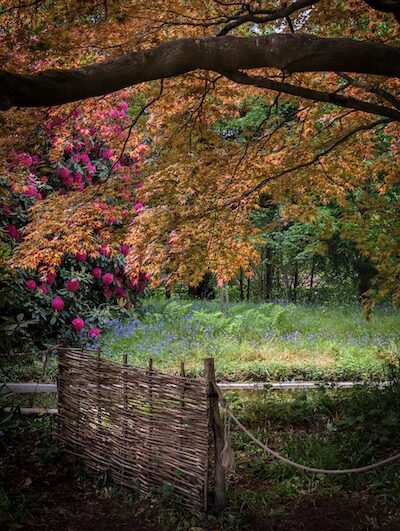The Lowest Place: A reflection on humility
Jo Acharya | May 19, 2021
I love visiting National Trust gardens. I’ve only been gardening myself for a few years, so it gives me fresh inspiration and ideas to try out. Of course, it’s also a chance for me to show off my newfound knowledge, and for Dan to marvel at my expertise.
“Wow, Jo,” he often says in awe, “I can’t believe you know so much about plants, as well as being completely amazing in every other way.”
I’m kidding. He never says that. Dan likes taking pictures of flowers, but he’s not the slightest bit interested in what they’re called, or anything else about them. It’s a tragedy, but it doesn’t stop me chattering away.
Last weekend, we visited Emmett’s Garden in Kent. It was awash with late spring colour, and I was in my element, pointing out the different plants while Dan politely ignored me.
We came across a huge shrub, dark and shiny, each stem topped with new leaves that were bright coral pink.
“It looks like a rhododendron,” I said, “But it’s a very unusual one.” I babbled on, growing more confident: “Yes, it’s definitely a rhododendron.”
And then a few metres away, an older lady, who had clearly overheard me, said pointedly to her friend, “It’s a pieris.”
Of course it was a pieris. In my defence, the leaves of both shrubs do look similar. But I hadn’t even registered the telltale clusters of bell-shaped flowers right in front of my nose. To make matters worse, I have a pieris in my own garden – I know exactly what they look like!
But it was a small mistake. Tiny and unimportant. Does it matter if I can’t tell a pieris from a rhododendron? Who cares?
Well I cared. I suddenly had a strong urge to make this lady understand that I actually do know quite a bit about plants, and I’m not really the over-confident fool I looked like at that moment! I felt humbled, and I didn’t like it.
Pride and humility in the Bible
There is a lot about pride and humility in the Bible. The famous phrase ‘pride comes before a fall’ comes from Proverbs 16:18. We all know the feeling of that fall, when humility is forced upon us. And it’s one of the reasons the Bible tells us to voluntarily choose humility.
In Luke 14, Jesus gives the example of guests at a wedding feast. If you take the best seat, you might be asked to move so that someone more important than you can sit there. But if you take ‘the lowest place’, the host might call you up to a better position. Jesus finished by saying, “All those who exalt themselves will be humbled, and those who humble themselves will be exalted.”
But it goes deeper than that. We’re not supposed to be humble just so that we can eventually feel proud when others raise us up. We’re supposed to be humble because it reflects reality.
The truth is, I’m not completely amazing in every way, and neither are you. Humility is fitting for people who get things wrong and make mistakes – whether tiny, unimportant ones, or serious and damaging ones. Humility recognises that other people sometimes know more than us, see more clearly than us, and are better at some things than we are.
But it goes deeper even than that. Because the model of humility that we are given to follow is… Jesus. Jesus, who is wise and merciful, perfect and sinless. Jesus, who is God himself in human form. In Philippians 2, the Bible’s famous reflection on humility tells us that Jesus, ‘being in very nature God’, humbled himself and came to walk among the people he had created. He lived to serve others and to do the will of his Father. Death had no right to claim him, but he willingly, humbly allowed death to claim him. He took our place in order to completely cancel death’s claim on us. Jesus doesn’t just call us to be humble. Jesus is humble.
Jesus’s willing humility was a choice to lovingly treat others as though they were more important than himself, and to prioritise their needs above his own. And if our Lord Jesus is humble, then we have nothing to fear from humbling ourselves. Humility is a chance to come down and join him in the lowest place, where he loves to dwell among us.
Joining Jesus in humility
The Victorian poet Christina Rossetti wrote:
Give me the lowest place: not that I dare
Ask for that lowest place, but Thou hast died
That I might live and share
Thy glory by Thy side.
Give me the lowest place: or if for me
That lowest place too high, make one more low
Where I may sit and see
My God and love Thee so.
Next time I visit a National Trust garden, I’ll try to resist the temptation to show off my knowledge. But if you overhear me mistake a daisy for a dandelion, or a daffodil for a tulip – please, feel free to humble me!
Join our community
Sign up for bonus content, special offers and free gifts!


